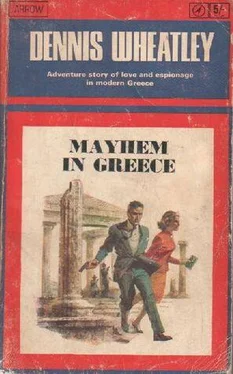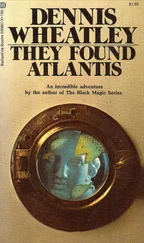Pulling thoughtfully at his little beard, he said: T sympathize with your situation, Mr. Grenn. To be deprived of a comfortable home on account of your political opinions is certainly hard. Yes, I would like to help you. Return here at ten o'clock on Monday morning. By then I think I will have found some employment for you.'
Two minutes later Mr. Havelka was striving not to wince as his hand was pressed in an iron grip by a beaming Robbie. Lightheartedly, Robbie ran downstairs and went out into the street.
It was another pleasant day; so he crossed the road, and went into the park. Even in spring the flowers there were indifferent, and during summer it was an arid waste; but as it was only a few hundred yards from the British Embassy Robbie often went for a stroll there in the morning.
He had just reached the big pavilion near the centre of the park when a sudden thought struck him. When telling the lies he had concocted to Havelka he had said that his uncle had thrown him out of the house. What if the Czechs discovered that was not true? They would then certainly believe him to be a spy, and his very successful morning's work would have been entirely wasted. Still worse, in future, as far as the Czechs were concerned, he would, be a marked man; so what hope would he then have of succeeding in the task he had set himself?
As swiftly as the deflating of a pricked balloon, the elation he was feeling drained away from him. With his hands in his trouser pockets, with downcast head, he strolled on until he reached the southern end of the park. Crossing the road, he entered the grass enclosure that contains the remains of the vast Olympieion. Sitting down on a fragment of one of the mighty fallen pillars of the Temple, he strove to think things out.
After half an hour he decided that there was only one thing for it. He must leave the Embassy and go to live in an hotel.
That day Sir Finsterhorn was giving a lunch party, and it was after three o'clock before the last of his guests had departed. The moment he had courteously bowed them away he made for his sanctum. Robbie followed him, paused in the doorway, and said:
'I'd like to speak to you for a moment, Uncle. May I come m?'
The Ambassador had just sat down at his desk, and he looked UP with a slight frown. That morning he had received a despatch from the Foreign Secretary concerning some rather delicate negotiations, and he was anxious to get to work on it without delay; but he said with his habitual politeness:
This isn't a good time, Robbie. But if it will take only a moment go ahead.'
T wanted to let you know, Uncle, that I've got a job.'
'Really!' Sir Finsterhorn's long face lit up with one of his rather rare but charming smiles. 'Well, I'm delighted, Robbie. Yes, delighted. What sort of a job is it?'
Translating documents. At least, I expect that's what, they'll want me to do.' Robbie took a deep breath then blurted out: 'Anyway, it's at the Czech Legation.'
The Ambassador suddenly became completely still. 'What's that you say?' he demanded, after a moment. 'The Czech Legation. If this is a joke, Robbie, I regard it as in the worst of taste. You cannot be speaking seriously.'
Robbie swallowed hard. 'Yes, sir, I am. I saw Mr. Havelka this morning; and he's promised to give me a job, starting on Monday.'
Sir Finsterhorn came slowly to his feet. 'Havelka took you on personally? I can't believe it. What possible reason could you have given to induce him to do so?'
'Well—er—it was my knowing the Central European languages. Making use of them is about the only way I could earn money. And . . . and, after all, Uncle, for months past you have been urging me to get a job.'
'I have indeed. You were utterly spoiled by your aunt and that old nurse of yours. Years ago, you should have been sent to a place where you could have been trained in some work suited to your limited abilities. That you are now twenty-three and still idling your life away is perfectly scandalous. But that you should be employed by the Czech Legation is unthinkable. You surely must know that, as long as the Cold War continues, those people must be regarded as our enemies. In fact, I am completely at a loss to understand Havelka's taking you on. That is, if you gave him your right name.'
'Oh, yes. I told him who I was and—and, to tell the truth, sir, I had to spin him a yarn that I had quarrelled with you over politics. I led him to believe that I was pro-Communist. It's really that I wanted to tell you. You see, to make the story stick I'll have to leave the Embassy and go to live in an hotel.'
The Ambassador's blue eyes sparkled angrily. 'And so you shall, my boy,' he snapped after a moment. 'I see the whole thing now. Havelka jumped at the chance of making a fool of me. For the British Ambassador's nephew to take service with the Czechs will make me the laughing-stock of Athens. When your aunt died you were incapable of looking after yourself. My wife and I gave you a home and this is how you have repaid us. But in this past year you have learnt enough to stand on your own feet. Very well, then. Pack your bags and don't let me see you here again.'
Hero Number One
Ten minutes later Robbie, near to tears, ssat hunched up in the armchair in his bed-sitting room. For a whilde he was so completely shattered that he could nojt co-ordinate Ihis thoughts. He had been prepared for his uncle to show markced disapproval when he admitted that he was posing as a pro-«-Communist, but had hoped that the fact that he had at last actusally got himself a job would placate him. It had not occurred to him for one moment that, because he was to be employed by thee Czechs, Sir Finster-horn would be sufficiently enraged to castt him off and forbid him the Embassy. To attempt to spy o:>n the Czechs while retaining his sheet anchor was one thing; to be thrust out into the world and on his own for the first time was a very different matter.
For a while he contemplated abandoming his plans and returning to England. Aunt Emily had left hiim her pleasant house at Cheltenham, together with its contents. Sir Finsterhorn had wanted him to sell it; but it was the only Ihome he had known, and he did not need the money. Moreoveir, old Nanny Fisher, now nearly seventy, was still alive, and hee could not bear the thought of her being put out at her age to rxnake a new home for herself. Therefore he had dug in his toes against even letting the house, and had arranged for her to receive a sufficient sum to maintain it for him and to keep on their cooik.
But Athene's words to him, conveyed thirough the rustling of the leaves on her sacred tree, were still frcesh in his mind. She had charged him to go through with his qmest to the bitter end, whatever might befall, and a command froim the goddess was not to be ignored lightly.
He considered the possibility that he had conly imagined hearing her voice. Had he heard it in a dream, he; could have accepted that, but he had been wide-awake, and hatd deliberately sought her counsel Further thought convinced hiim, too, that the harsh treatment meted out to him by his uncle wvas typical of the unexpected misfortunes which heroes of ancitent times always met with on their quests.
The inhabitants of Olympus had beem a jealous lot, and Perpetually quarrelling with one another. For one of them to take a mortal under his or her protection \was quite enough for °fte of the others to set about inflicting pairn and grief upon him and hamper him at every turn. It might be that or, perhaps, Robbie thought, he might unwittingly have offended some member of the Olympian family.
They were all incurable busybodies. Apart from intriguing among themselves and making love, their principal sport had been to come down to earth and mingle with mortals; but not in their beautiful trimmings. They assumed disguises as crippled beggars or wrinkled old women clad in filthy rags. One of their favourite games was to ask for a night's lodging or a free ride on a ferry, and woe betide the unfortunate person who refused their request; he was lucky if he was not blinded there and then or turned into a lizard. It could be argued that these judgments on the spot were a far more effective way of inducing the ancient Greeks to be charitable to the poor and humble than the threats of hell and damnation in some uncertain future which were thundered forth centuries later by Christian fanatics. All the same, Robbie felt, these totally unexpected actions by the gods must have been extremely worrying for their worshippers.
Читать дальше












